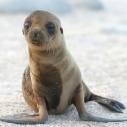 UPDATE: The California Wildlife Center has begun construction of an emergency seal rehabilitation facility in the Santa Monica Mountains. Read more.
UPDATE: The California Wildlife Center has begun construction of an emergency seal rehabilitation facility in the Santa Monica Mountains. Read more.
For the last couple of weeks, Heal the Bay staff have fielded questions about the hundreds of sea lion pups washing up on our local beaches. We love these animals too, so we’re very concerned. We’ve contacted our partners and compiled the latest information to inform you of the current status of this crisis.
The local California Wildlife Center (CWC) and other rescue/rehab places are inundated, and CWC is trying to raise emergency funds via grants and donations to set up a temporary rescue and rehab center for the overflow of seals and sea lions in L.A. You can donate to their efforts.
In addition to the rescue and rehabilitation efforts, the National Oceanic Atmospheric Administration (NOAA) is assembling an independent team of scientists to review data collected and to determine potential next steps. NOAA’s investigative team is in the process of developing a plan to test samples from both live and dead animals. Blood and tissue samples will be tested for bacterial, viral and other infectious agents. Samples will also be tested for radio-nucleotides. Results will be available in 1-3 months, and you can track the progress at California Sea Lion Unusual Mortality Event.
This is the sixth UME involving California sea lions that has occurred in California. Prior UMEs were declared in 1991, 1992, 1998, 2000 and 2002. Previous UMEs were caused by leptospirosis (1991), El Niño conditions (1992) and domoic acid toxicity (1998, 2000, 2002).
If you find a marine animal in distress:
- Don’t touch! Do not pick up, pour water on or feed the animal. They are wild animals and can bite. They also are easily stressed by humans.
- Do not return the animal to the water. Seals and sea lions temporarily “haul-out” on land to rest. Harbor seal mothers often leave their pups ashore while they’re feeding at sea. A beached whale, dolphin, or porpoise should be reported immediately.
- Give the animal its space. Maintain a distance of at least 50 feet. Keep people and dogs away.
- Call California Wildlife Center at 310-458-WILD if you find a distressed marine mammal in Malibu, or Marine Mammal Rescue at 1-800-39-WHALE for Santa Monica to Long Beach. For other areas, consult our list below of rescue and rehabilitation groups in Southern California. When calling, it’s important that you be able to identify your location and provide details of the animal and its condition.
Southern California Rescue and Rehab Groups:
- California Wildlife Center: Marine mammal rescue from Santa Monica to Ventura; native wildlife rehabilitation, Phone: (310) 458-WILD (9453)
- International Bird Rescue, marine/shore birds in L.A.: Phone: (310) 514-2573
- Marine Mammal Care Center, pinniped (fin-footed mammals) rehabilitation in L.A.: Phone: (310) 548-5677
- Marine Mammal Rescue, from Santa Monica to Orange County: Phone: 1 (800) 39-WHALE (9-4253)
- Pacific Marine Mammal Center, rescue and rehabilitation for pinnipeds in Orange County: Phone: (949) 494-3050
Want to do more? Donate items from California Wildlife Center’s Amazon wishlist to help alleviate this crisis, or stay up-to-date via the California Wildlife Center’s Facebook page.
You can also donate to The Waitt Foundation challenge grant. Every dollar contributed by the public will be matched one-to-one by the Waitt Foundation and dedicated to the direct and urgent care of stranded sea lion pups.
— Dana Roeber Murray, Heal the Bay’s Marine and Coastal Scientist
Source: https://www.healthebay.org/blogs-news/help-hundreds-sick-sea-lions-along-our-shores
